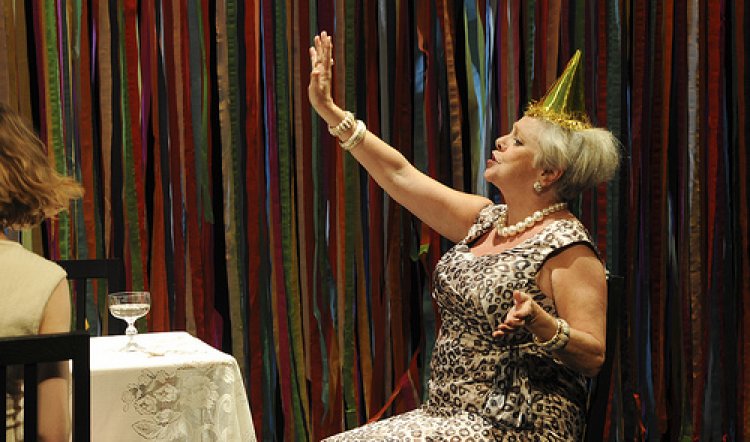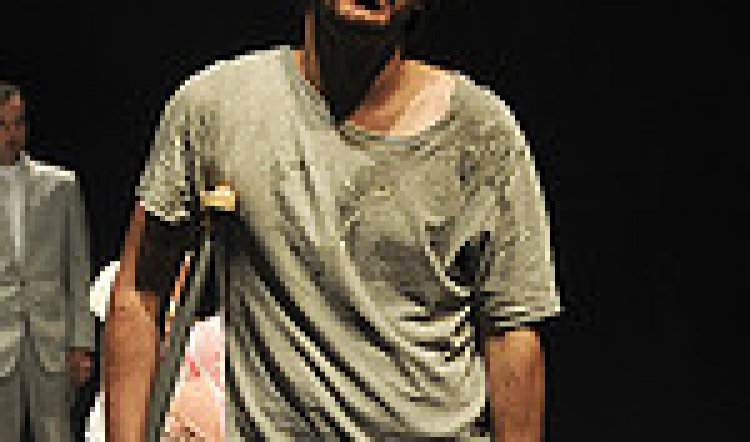
CAT ON A HOT TIN ROOF
CAT ON A HOT TIN ROOF, at Belvoir St Theatre, 16 February-21 April 2013. Photos by Heidrun Lohr; above Lynette Curran; right: Ewen Leslie.
It's hard to believe that many Belvoir regulars or theatre-goers in general haven't heard or read about the disaster that befell this production a couple of weeks ago: Anthony Phelan's late withdrawal due to ill health. But apparently - according to the loo queue and bewildered faces in the auditorium - many had not. And neither had they seen the not very prominently placed sign in the foyer (mostly obscured by bodies) that would have alerted them to the last-minute cast member, the gutsy, script-in-hand Marshall Napier. There is a sheet in the program, of course, but many don't buy them.
The point of these observations is twofold: it would surely be a courtesy to announce the cast change from the stage before the lights go down while Napier is still carrying a script; and also, it might account for some of the restlessness and whispering in the audience including one woman who audibly asked her companion: "why is he reading the script?" In truth, the script was used rarely (on the postponed media night - February 27) and Napier did a mighty job under the circumstances. Nevertheless, the connection between the stage and the audience is fragile at the best of times and to neglect to shore it up by the simplest means seems wilfully obtuse or just plain stupid.
What was more bothersome however was the generally undercooked feeling of the production and how one was supposed to respond to that in view of the above. Director Simon Stone says in his notes that he believes, "on any given night in the theatre, the play being performed should feel to an audience like it's never been performed before…" Well, yes, surely that's the aim of any actor, any director in any production? Still, it's unlikely Stone meant the show to be quite so "never performed before" at this stage, but who knows. On reflection, it's hard to imagine the production becoming much more cohesive in the coming weeks, no matter what and for one particular reason: the play's language.
Last year Stone gave us an Aussie-fied version of Arthur Miller's own classic of family dysfunction, Death of a Salesman. Although some didn't get on with Willy, Linda, Biff and Co sounding Bondi and Bankstown rather than Brooklyn and Boston, it didn't jar and distract in the way it does in Cat on a Hot Tin Roof. And that's because the rich syrup of the Southern voice is integral to the text and to the playwright's intent. Thinking about the two plays and the two productions, I believe you can't take Tennessee Williams out of the South. It destroys the language and rhythms of the play and, significantly, it doesn't illuminate. It would be something like staging a French play where the actors speak French with Australian English accents.
The American Southern voice and culture (in which this play and all Williams' work are steeped) are unique and all-pervasive - and as foreign to the rest of the USA as they are to us. Rather than universalising the characters and the family for a 2013 Sydney audience, the result is just the opposite. And in this instance, without experiencing the uniquely luscious combination of voice and poetry and being immersed in it, distanciation is perilous and inevitable. These people - a toxic but familiar Everyfamily - become dry shells, their emotions desiccated and brittle so that, with rare exceptions, the tragedy of the disintegration of people and their dreams is sadly reduced and it's difficult to care.
The character most affected by the Australian voice is Maggie (Jacqueline McKenzie). As the sexually deprived wife of the family's favourite son, she occupies the play's early scenes with a monologue delivered as she dresses for Big Daddy's birthday party. The witness to her efforts and words is her husband, the sullenly intoxicated Brick (Ewen Leslie), and his indifference to her should be painful. Instead, this Maggie sounds childlike rather than womanly, childish rather than viperish and if Brick slapped her few would be surprised. And as the pivotal scene is played for laughs rather than for the intense frustration signified by her discontent with her wardrobe, the effect is to diminish Maggie. McKenzie is a fine actress but she hasn't yet nailed this character; and it could be because she cannot use Maggie's voice and there isn't an Australian equivalent to find.
As the tormented and conflicted Brick - mourning the death of his "special friend" Skipper - Ewen Leslie is a brooding, tempestuous presence and it's easy to see why Maggie finds his disinterest so impossible to bear. His permanently weary, semi-comatose state lends itself to the production's creative ethos - a barely-animated drawl hopping about on a crutch and plastercast that is both sexy and enigmatic.
On the plus side, it is terrific to see Lynette Curran - as Big Mama - regaining her place in the sun in the absence of Hollywood's newest darling, Jacki Weaver, with whom she is often compared. Curran is a marvellous Big Mama and the pathos she brings to the ditzy matriarch is perfectly judged. She is central to whatever successes there are in the show and her strength and courage in the role are tremendous.

When the play was first staged in 1955 the vulture-like family was perhaps a little less well known as a social phenomenon than it is today. Thanks to the Rinehart clan and their ilk we're only too familiar with the truism that where there's a Will or a massive fortune there's an unholy mess of greed and dreams. So the undisguised avarice of wildly fecund sister-in-law Mae (Rebecca Massey) is almost commonplace as is her smarmy weakling-older brother husband Gooper (Alan Dukes). Both are excellent and Massey invests Mae with some creepily authentic good Christian malevolence.
Perhaps the only aspect of the play that dates is the idea that Big Daddy's impending death from cancer would be kept from him and his wife. This practice - of "protecting" the doomed one - now seems as quaint as it is cruel and Big Mama's reaction, when she is told, is the most emotionally poignant of the night. It's also the most effective use of the revolve: a triangulated tableau of Mama, Brick and the rest is both dramatic and simple as it slowly turns while they are frozen in the moment.
The bare revolve keeps the play moving - no doors to open and close and no scenery to change - while the various props are placed on it from behind a curtain of multi-coloured streamers (design Robert Cousins). The costumes (Alice Babidge) are equally simple signifiers, such as Mae's psychedelic, cheap stretchy mini-dress that emphasises her "bump"; while Maggie's chosen party shoes - red-soled Louboutin stilettos - nod at her childless and extravagant life.
In seeking to create the play anew (good thinking) Simon Stone made a good decision in casting against the almost indelible received norms of the fabled movie version: Burl Ives was onomatopoeically Big Daddy. Elizabeth Taylor was the hottest, most voluptuous Maggie the Cat imaginable, while Paul Newman's ascetic beauty meant the unspoken could be projected onto his face and escape censorship. Anthony Phelan would have broken the mould as the patriarch, and Leslie and McKenzie could have more than held their own too and created new images. But the South was integral to the movie because it is the foundation of the play's structure and the family's raison d'être - without it the sense is lost.
It's not as if authentic American voices aren't possible on an Australian stage. In Charmian Gradwell we have a voice coach whose work at the Sydney Theatre Company is simply brilliant. And Jennifer White too: the varied regional and class voices in Tot Mom astonished visiting Americans ("how come you can bring in American actors?").
And while I dislike making comparisons, in this instance it's impossible not to think of that production in relation to this one. One was a once-in-a-lifetime experience of witnessing a play being reborn as if the playwright had written "the end" just the day before; the other fails that test entirely. Too sad.



